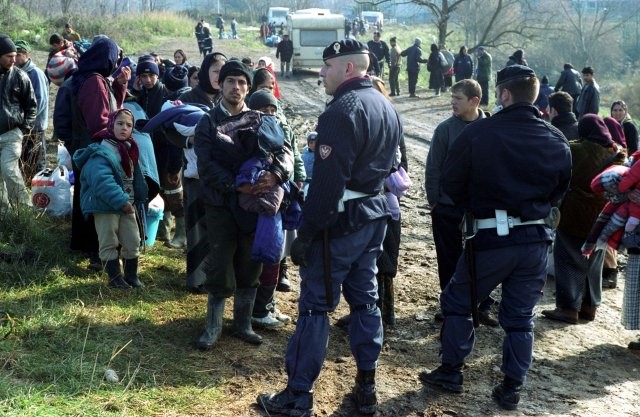Two cheers for the European Parliament Roma Resolution
20 February 2019
 While pro-Roma civil society lauded the latest European Parliament resolution on Roma inclusion post-2020, a healthy dose of skepticism is in order concerning the European Peoples’ Party’s commitment to combating racism and intersectional discrimination, promoting gender mainstreaming and Roma participation, and engaging in truth and reconciliation.
While pro-Roma civil society lauded the latest European Parliament resolution on Roma inclusion post-2020, a healthy dose of skepticism is in order concerning the European Peoples’ Party’s commitment to combating racism and intersectional discrimination, promoting gender mainstreaming and Roma participation, and engaging in truth and reconciliation.
Repeated failures by the EPP to condemn anti-Roma hate speech by right-wing politicians in many member states cast doubt on the commitment of the largest political grouping in the assembly to take the substance of this resolution beyond Strasbourg.
The good news
The resolution itself, driven largely by progressive MEPs within the Parliament, is welcome in calling for a strengthened post-2020 Framework for Roma inclusion and a ‘stepping up’ in the fight against antigypsyism. It calls on the Commission to encourage Member States to ensure that their strategies adopt “a multiple and intersectional discrimination, gender mainstreaming and a child-sensitive approach” which is mindful of the diversity of Roma communities.
In addition to the above, Member States are further ‘encouraged’ to ensure a bottom-up Roma participatory approach to design, monitoring and evaluation of national strategies; to ensure that EU funds intended for Roma inclusion are not misused; and to “include a truth, recognition and reconciliation process in their Strategies for the sake of trust-building”.
This is all very well and pertinent, especially considering the dismal failure of the national Roma integration strategies to date. The recent synthesis report by the Roma civil monitor found that across Europe, implementation of NRIS remains random and haphazard; governance is often weak and incoherent, while the patterns and habits of discrimination go largely unchecked. Combined with an alarming rise in antigypsyism, which leaves many communities vulnerable to forced evictions, discriminatory policing, racially motivated hostility and violence, the civil society verdict gives little cause for optimism.
On the basis of these civil monitoring reports, the latest research by FRA on antigypsyism, and the Commission’s own assessments, the likelihood is that there won’t be much by way of good news on Roma inclusion by the Framework’s end-date of 2020. So the Commission’s determination to take the Framework beyond 2020, and its commitment to prioritize combating racism and discrimination is commendable; and this latest resolution from the Parliament can definitely be filed under ‘good news’.
… and the bad news
But the bad news is that despite resolutions and declarations of good intent within this chamber, in the great outdoors beyond Strasbourg, things have turned decidedly ugly. Not only are the NRIS flawed and failing, but right wing politicians are increasingly resorting to anti-Roma hate speech in the run up to this year’s national and European elections.
The EPP’s GERB colleagues in Sofia have no problem governing in coalition with the racist thugs of the United Patriots, whose ministers have described Roma as “brazen, feral, human-like creatures”, called for harsh measures because “Gypsies in Bulgaria have become exceptionally insolent”, and frequently engage in anti-Roma hate speech that amounts to incitement to racial hatred.
Last year, in an open letter to the EPP, the ERRC asked how GERB could reconcile appointing far right extremists to prominent positions with the EPP’s priorities to “achieve a common understanding between cultures and religions to ensure a peaceful coexistence of people in Europe”. EPP President Daul defended his Bulgarian MEPs, and stated that GERB “continues to monitor closely the actions and comments of the United Patriots party.” So, no EPP red lines crossed in Sofia.
The EPP came to the defense of Italian foreign minister Matteo Salvini In the parliamentary debate that followed his anti-Roma remarks about carrying out “a mass cleansing street by street, piazza by piazza, neighbourhood by neighbourhood”, and conducting an ethnic Roma census. Lest there be any doubt about the racist intent and Salvini’s deep contempt for Roma, he told a television interview, “Irregular foreigners will be deported via agreements with other countries, but Italian Roma unfortunately, we have to keep them at home.”
Against the tide of condemnation from progressive MEPs, Vice-President Livia Jaroka from Hungary’s far-right Fidesz spoke of fake news, and explained that Salvini’s Roma census had its merits, “because it is necessary to ascertain whether EU funds are being used to improve the situation of Romani people or not." The European Committee of Social Rights (ECSR) was less complacent about the treatment meted out to Roma communities in Italy, and in January repeated its concerns “particularly with regard to racist misleading propaganda against Roma and Sinti indirectly allowed or directly emanating from the authorities”.
No more ‘red lines’ for the EPP?
But, as the failure to take action against Hungary’s Fidesz has made abundantly clear, there seem to be no more red lines for the EPP. Despite Viktor Orbán’s hate-filled anti-migrant rhetoric, his full-frontal assault on academic freedom, media pluralism and civil society, and the regime’s systematic undermining of judicial independence, Fidesz still enjoys shelter under the EPP umbrella. The inaction of the Peoples’ Party has made nonsense of chairman Manfred Weber’s earlier assertion that “extremism and populism must be eliminated in Europe.”
The EPP stands to lose ground to far-right Eurosceptic forces in the May elections, and without the Fidesz delegation, its current and future possible dominance of the Strasbourg parliament would be imperiled. If the latest provocation from Budapest goes unpunished (see photo and caption), one thing is certain, the EPP won’t lift a finger to censure any of its members for racism or rights abuses when it comes to Roma.

And this is the great pity, for the content of this resolution on Roma inclusion after 2020 is a credit to its drafters and reflects the efforts invested in dialogue with civil society. A number of progressive and committed members of the European Parliament do work with their political parties back in their home countries to fight all forms of antigypsyism and cultivate majority support for Roma inclusion policies. But many more would need to do likewise.
On the centre right, those within the EPP who still uphold European values would need to be more assiduous in their efforts with their comrades back home; for there must be no more equivocation over anti-Roma racism if this resolution is to have a life beyond Strasbourg and beyond 2020.




